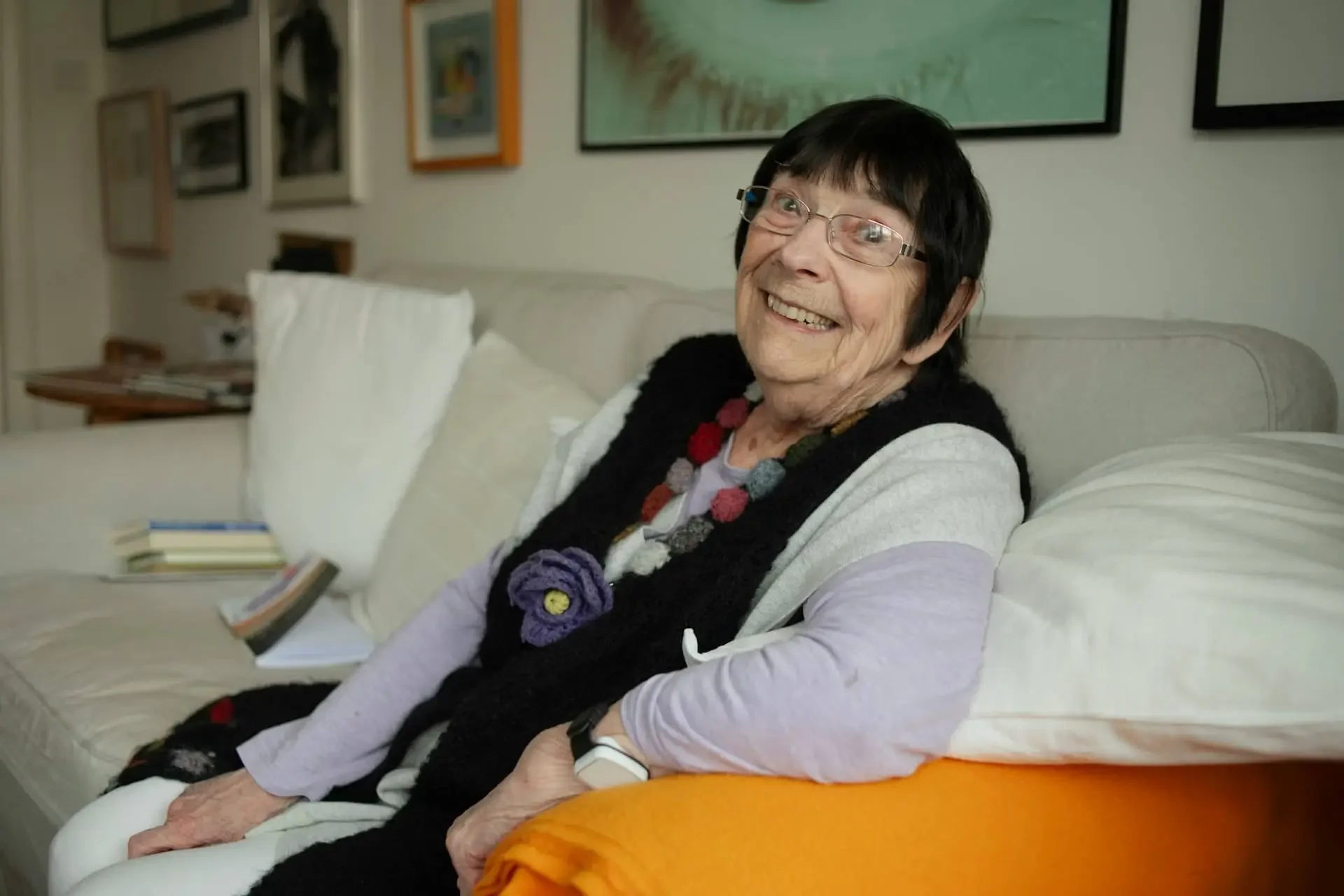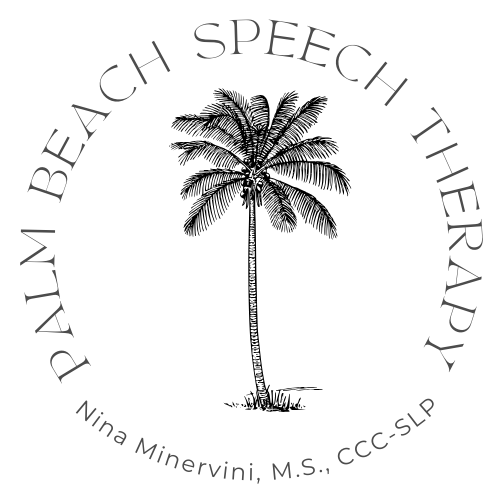Cognitive Communication Therapy in Lake Worth, FL
When illness or injury affects the brain, the impact often extends beyond physical symptoms. Many adults experience changes in memory, attention, organization, and reasoning, all cognitive abilities that are essential for communication and daily independence.
At Palm Beach Speech Therapy, Nina Minervini specializes in cognitive-communication therapy at home in Lake Worth that helps you rebuild these critical skills through personalized, evidence-based treatment.
Learn About Cogntive Communication Therapy in Lake Worth Beach, FL
Fill out this short form and Nina will contact you as soon as possible.
Understanding Cognitive-Communication Disorders
Cognitive-communication disorders occur when brain function is disrupted, affecting the mental processes required for effective communication. Unlike speech or language disorders that primarily affect articulation or word-finding, cognitive-communication challenges stem from changes in how the brain processes, stores, and retrieves information.
These disorders can make it difficult to:
Follow multi-step conversations or instructions
Remember important information like names, dates, or appointments
Stay organized and plan daily activities
Solve problems or make decisions
Focus attention during conversations or tasks
Understand social cues or adjust communication based on context
Recognize and compensate for cognitive changes
The impact often ripples through daily life: from managing medications and finances to maintaining relationships and participating in community activities. Cognitive-communication therapy addresses these communicative challenges at their source, helping you develop both restored abilities and practical compensatory strategies.
What Is Cognitive Communication Therapy?
Cognitive-communication therapy is a specialized area of speech-language pathology that targets the cognitive processes underlying communication. A licensed speech-language pathologist (SLP) works with you to strengthen or compensate for difficulties in:
Attention and Concentration
Attention is the gateway to all other cognitive functions. Therapy helps improve your ability to:
Maintain focus during conversations and activities
Filter out distractions in busy environments
Shift attention appropriately between tasks
Sustain concentration over longer periods
Memory and Recall
Memory challenges can affect independence and safety. We work on:
Short-term memory — retaining information briefly (like phone numbers or instructions)
Working memory — holding and manipulating information (like calculating tips or following recipes)
Long-term memory — storing and retrieving personal information, procedures, and learned skills
Prospective memory — remembering to complete future tasks (taking medication, attending appointments)
Executive Functioning
Executive functions are the brain's "management system." Therapy addresses:
Planning and organization — breaking tasks into steps, creating schedules
Initiation — starting tasks without prompting
Flexibility — adapting when plans change
Self-monitoring — recognizing errors and adjusting behavior
Inhibition — controlling impulses and staying on task
Problem-Solving and Reasoning
We strengthen your ability to:
Interpret situations and identify problems
Generate and evaluate potential solutions
Make safe, informed decisions
Apply logical reasoning to everyday scenarios
Self-Awareness and Compensatory Strategies
Understanding your strengths and challenges is crucial for progress. Therapy helps you:
Recognize cognitive changes and their impact
Develop realistic expectations and goals
Learn and implement effective compensatory techniques
Build confidence in using tools like calendars, reminders, and checklists
All therapy activities are functional and personalized. We focus on skills that directly impact your daily routines, relationships, and independence.
Who Benefits from Cognitive Communication Therapy in Lake Worth?
Lake Worth is home to a large population of adults who benefit from speech therapy services. Below are some of the conditions that Nina supports with cognitive communication therapy.
Stroke Survivors
A stroke can disrupt attention, memory, reasoning, and awareness. Many stroke survivors experience:
Difficulty following conversations or remembering what was said
Challenges with planning and completing daily tasks
Reduced awareness of deficits (anosognosia)
Problems with impulse control and decision-making
Cognitive-communication therapy helps rebuild these skills while teaching strategies to maximize independence during recovery.
Traumatic Brain Injury (TBI)
Whether from a fall, car accident, or sports injury, TBIs can cause:
Slowed processing speed
Memory gaps and confusion
Difficulty with organization and time management
Changes in personality, emotional regulation, or social awareness
Our therapy provides structured rehabilitation that addresses both cognitive deficits and their impact on communication and relationships.
Dementia and Alzheimer's Disease
Progressive cognitive changes affect memory, language, reasoning, and daily functioning. Therapy focuses on:
Maintaining skills and independence as long as possible
Teaching compensatory strategies and external memory aids
Supporting meaningful communication with family members
Training caregivers in effective communication techniques
We work closely with families to create supportive environments that reduce frustration and enhance quality of life.
Parkinson's Disease
Beyond movement symptoms, Parkinson's often affects:
Executive functions like planning and multitasking
Processing speed and mental flexibility
Attention and working memory
Communication efficiency and social engagement
Cognitive-communication therapy complements physical and occupational therapy to address the full spectrum of Parkinson's challenges.
Other Neurological Conditions
We also support adults experiencing cognitive-communication challenges due to:
Multiple sclerosis (MS) — cognitive fatigue, memory changes, slowed processing
Brain tumors — localized cognitive deficits depending on tumor location
Encephalitis or meningitis — widespread cognitive changes after infection
Anoxic brain injury — oxygen deprivation affecting memory and reasoning
Post-COVID cognitive symptoms — "brain fog," memory issues, attention deficits
Concussion and mild TBI — persistent cognitive symptoms affecting work and daily life
Each condition presents unique challenges, and every therapy program is tailored to your specific needs and goals.
When to Seek Cognitive Communication Therapy
Consider cognitive-communication therapy if you or a loved one are experiencing:
Memory changes — frequently forgetting appointments, conversations, or daily tasks
Attention difficulties — trouble focusing, easily distracted, can't follow conversations
Organizational challenges — difficulty planning, managing time, or completing multi-step tasks
Problem-solving struggles — confusion with decisions, trouble reasoning through situations
Slowed thinking — needing more time to process information or respond
Awareness concerns — not recognizing cognitive changes or their impact on safety
Communication breakdown — losing train of thought, tangential speech, difficulty understanding complex information
Daily living challenges — trouble managing medications, finances, household tasks, or self-care
Early intervention often leads to better outcomes. Even if cognitive changes are progressive, therapy can help maintain function, teach compensatory communication strategies, and improve quality of life.
The Cognitive Communication Therapy Process
Initial Comprehensive Assessment
Your journey begins with a thorough evaluation that includes:
Medical and Social History Review We discuss your diagnosis, medical treatments, medications, and how cognitive changes are affecting your daily life, relationships, and goals.
Standardized Cognitive Testing Using validated assessments, we evaluate:
Attention span and distractibility
Immediate, short-term, and long-term memory
Executive functions (planning, organization, reasoning)
Processing speed and mental flexibility
Problem-solving abilities
Self-awareness and insight
Functional Communication Assessment We observe how cognitive changes impact real-world communication:
Following and participating in conversations
Understanding and recalling information
Organizing thoughts and expressing ideas
Managing communication in different environments
Using compensatory tools and strategies
Environment and Support Assessment We consider your living situation, daily routines, support system, and available resources to ensure therapy recommendations are practical and achievable.
Personalized Goal Setting
Based on assessment results, we collaborate with you and your family to establish meaningful, measurable goals. Examples include:
"I will remember to take my medications twice daily using a pill organizer and phone reminders"
"I will successfully manage my weekly schedule using a planner with 80% accuracy"
"I will follow three-step cooking instructions to prepare simple meals independently"
"I will remember family members' names and recent events during conversations"
"I will complete my morning routine without prompting using a visual checklist"
Goals always reflect your priorities, the activities and abilities most important to your independence and quality of life.
Evidence-Based Therapy Sessions
Nina’s approach to speech therapy relies on evidence-based practice. Sessions combine restorative exercises (to rebuild cognitive abilities) with compensatory strategy training (to work around persistent challenges).
Attention Training
Sustained attention tasks with gradually increasing duration
Selective attention exercises with controlled distractions
Alternating attention activities that require task-switching
Divided attention practice (managing multiple information sources)
Memory Enhancement
Spaced retrieval techniques for learning new information
Elaborative encoding strategies (creating meaningful associations)
Categorization and organization exercises
Practice with external memory aids (calendars, alarms, journals)
Errorless learning approaches for important information
Executive Function Training
Multi-step planning activities with real-world scenarios
Time management exercises using visual schedules
Problem-solving simulations with increasing complexity
Self-monitoring strategies and error recognition practice
Cognitive flexibility exercises with changing rules or conditions
Functional Activities Therapy integrates your real-life tasks:
Managing medication schedules and medical appointments
Handling finances, paying bills, and budgeting
Meal planning, grocery shopping, and following recipes
Managing a calendar and daily schedule
Using technology (phones, tablets, apps) for support
Navigating your Lake Worth neighborhood and community
Compensatory Strategy Training We teach practical techniques that support independence:
External memory systems (written notes, smartphone reminders, whiteboards)
Environmental modifications (labeled drawers, visual cues, reduced clutter)
Self-cuing strategies (talking through steps, using checklists)
Communication strategies (asking for repetition, taking notes during conversations)
Family and Caregiver Education
Cognitive-communication disorders affect the entire family. We provide:
Education about your specific condition and prognosis
Training in effective communication strategies
Guidance on providing appropriate support without over-helping
Tips for modifying the home environment
Strategies for reducing frustration and maintaining dignity
Resources for additional support and community services
When family members understand your challenges and know how to help, progress accelerates and quality of life improves for everyone.
Home Practice Program
Between sessions, you'll engage in targeted exercises and real-world practice. Your home program:
Reinforces skills learned during therapy
Provides repetition necessary for neuroplasticity
Builds confidence in everyday situations
Includes clear instructions for you and caregivers
Adapts as your abilities improve
We make practice manageable and meaningful — never overwhelming.
Progress Monitoring and Plan Adjustment
Throughout therapy, we:
Track progress toward your specific goals
Adjust treatment intensity and focus based on your response
Celebrate improvements and identify emerging needs
Re-assess periodically to ensure optimal outcomes
Modify strategies as your life circumstances change
Recovery isn't linear, and we adapt our approach to support you through plateaus, setbacks, and breakthroughs.
Cognitive Communication Therapy Throughout Lake Worth
We proudly serve adults throughout the Lake Worth area and surrounding communities, including:
Lake Worth Beach — from the beaches to the downtown arts district
Lantana — including neighborhoods near Lantana Beach and Atlantis
Boynton Beach — throughout eastern Boynton Beach and coastal areas
Palm Springs — convenient service to this neighboring community
Lake Clarke Shores, Cloud Lake, and surrounding areas
Nina’s familiarity with the Lake Worth community means therapy can incorporate local landmarks, businesses, and routines. Practice navigating to Bryant Park, remember directions to your favorite Lake Avenue café, or organize a shopping trip to nearby stores; Nina makes cognitive exercises relevant to your actual life.
Contact Nina to get started!
📞 Call: (561) 797-2343
📧 Email: ninaminervini11@gmail.com
In-Home and Telehealth Options in Lake Worth
Palm Beach Speech Therapy brings expert cognitive-communication therapy directly to you through flexible service options:
In-Home Therapy
Nina travels to your Lake Worth home, providing therapy in your natural environment where:
Distractions and challenges mirror real life
We can assess and modify your actual living space
Practice activities use your own materials and routines
Family members can easily participate and learn
Transportation concerns are eliminated
In-home therapy is particularly valuable for adults with mobility limitations, transportation challenges, or those who benefit from familiar surroundings during treatment.
Palm Beach Speech Therapy provides in-home adult speech therapy across Lake Worth and Palm Beach County, serving both the historic east side and growing western communities. In East Lake Worth, visits are available in Parrot Cove, College Park, Downtown Jewel, Mango Groves, Bryant Park, South Palm Park, Eden Place, Vernon Heights, Royal Poinciana, and the Southeast Lucerne Historic District. We also serve western Lake Worth neighborhoods such as Lake Osborne, Lake Clarke Shores, Palm Springs, Floral Park, Vernon Heights, Island Estates, Cocoplum, Lantern Key, Winston Trails, Fountains Country Club, and Villages of Palm Beach Lakes. Whether you’re near the Intracoastal Waterway, downtown Lake Worth Beach, or west toward Jog Road and the Turnpike, Nina offers convenient, personalized in-home evaluations and therapy throughout the area.
Telehealth Therapy
Video platform telehealth speech therapy offers:
Convenient scheduling without travel time
Access to therapy from anywhere with internet connection
Screen-sharing for visual exercises and digital tools
Ability to practice technology-based compensatory strategies
Flexible options for clients with variable energy or health status
Many cognitive exercises translate beautifully to telehealth, and we often use a hybrid approach combining in-home and virtual sessions based on your needs and goals.
FAQS: Cognitive Communication Therapy in Lake Worth
How is cognitive-communication therapy different from regular speech therapy?
While traditional speech therapy focuses on articulation, voice, or language (words and grammar), cognitive-communication therapy targets the thinking processes that underlie communication — attention, memory, reasoning, and organization. Many Lake Worth adults, especially those recovering from a stroke at JFK Medical Center or adjusting to life after a traumatic brain injury, benefit from both types of therapy. Our sessions can take place right in your Lake Worth home or via secure telehealth for convenience.
How long does cognitive-communication therapy take?
Duration varies depending on your diagnosis, the severity of cognitive changes, and your personal goals. Some Lake Worth residents make measurable progress in 8–12 weeks, while others benefit from ongoing sessions — particularly those managing Parkinson’s disease or dementia. We regularly reassess progress to ensure therapy remains both beneficial and relevant to your daily routines near Bryant Park, Lake Avenue, or Downtown Lake Worth Beach.
Will my cognitive abilities fully recover?
Recovery varies depending on the cause and extent of brain changes. Many adults regain substantial cognitive function following stroke, TBI, or mild cognitive impairment. For progressive conditions such as Alzheimer’s disease, therapy focuses on maintaining abilities, teaching compensatory strategies, and promoting quality of life. Our Lake Worth therapy emphasizes realistic expectations while helping you reach your highest potential.
Is cognitive-communication therapy covered by insurance?
Yes — many insurance plans cover speech-language pathology services for cognitive-communication disorders when medically necessary. We can provide documentation for reimbursement, though clients pay at the time of service. Medicare Part B often covers these services with proper documentation. Palm Beach Speech Therapy proudly serves Lake Worth and neighboring areas like Lantana and Boynton Beach for both Medicare and private-pay clients.
Can family members participate in therapy?
Absolutely. Family involvement often enhances success. We encourage caregivers and loved ones to observe sessions, learn strategies, and practice communication techniques together. In Lake Worth, we often incorporate real-world practice such as ordering at local cafés or following schedules around town, helping families integrate therapy into daily life.
Do you work with clients who have dementia?
Yes. Although dementia is progressive, cognitive-communication therapy can help maintain independence longer, reduce frustration, and improve meaningful conversation. For Lake Worth families, we also offer caregiver training sessions — equipping loved ones with strategies that make communication easier at home or during outings near Lake Worth Beach Park.
Can therapy help with “brain fog” after COVID?
Yes. Post-COVID “brain fog” often affects attention, memory, and processing speed. Our Lake Worth-based therapy includes structured cognitive rehabilitation to target those deficits and teach compensatory techniques. Many clients report clearer thinking and more organized routines within a few weeks of consistent sessions.
Let’s talk about cognitive communication therapy in Lake Worth today.
Fill out the form below and I’ll contact you within 24 hours to discuss your needs and schedule a session.







